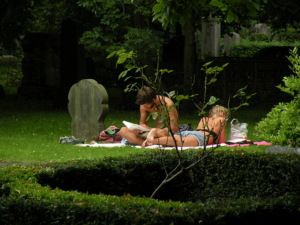News
Prices rising at Danish cemeteries
This article is more than 9 years old.
Families opting out of churchyard burials as fees get more expensive

One way to get the most out of the family plot (photo: Pedro Cambra)
Danish religious leaders are worried that Danes will decide against burial in church cemeteries now that the state church Folkekirken has raised prices for burial plots and maintenance.
The church said that the move is intended to raise funds to help keep churches solvent, but at least one bishop has expressed concern that the Danish cemetery culture could be threatened by the move.
“We have known for decades that the cemetery culture is changing, with many people decided on cremation over a burial,” Elof Westergaard, the bishop of Ribe diocese and president of the Danish cemetery association told Kristeligt Dagblad.
“However, it is unfortunate and inappropriate that rising costs are accelerating that development.”
READ MORE: More burying their loved ones at home
The high cost of dying
There a no hard numbers on how many people are deciding against a church burial, but Westergaard said he suspected it was “a significant number”.
One 89-year-old parishioner, Knud Friis, has since 2006 paid about 900 kroner a year for the maintenance of his wife’s grave. He hopes to buried by her side one day. The price of maintaining the plot spiked by 177 percent to about 2,500 kroner annually following a 2011 rate hike by the church ministry.
Prices are rising across the country, and people are choosing to forgo being buried and having their families be stuck with growing maintenance bills.










































